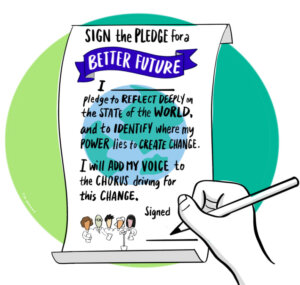Can we save social media? Should we?
It feels like every time I speak to someone, they tell me they’re stepping away from social media. The reasons? It’s not bringing them joy or connection anymore, so why stay around? They are finding posts kitschy, tedious, egotistical, or downright boring. AI isn’t helping either, because it’s just adding more meaningless content into feeds and people have had enough. It begs the question; can we save social media? Should we? My passion for social media has always been tied to this simple fact – social media was the democratization of information, which meant a handful of rich publishers didn’t own the information airwaves anymore, and we could have our own voice, our own ability to influence and be part of the discourse. But in the last 10 years it’s all gone downhill. It started with us raging at each other, which helped the technology companies work out this is where money could be made, and then traditional media, who didn’t know how to make money anymore in a social world, jumped into clickbait too, as it’s the only way they could work out how to make money. The result? There is no safe place to go anymore, no place for easy access to solid information, and here we are in a giant shit show. When we started raging at each other it was small, but now, negative emotions are the driving force online. No wonder good people are saying enough of that. Perhaps it’s a good thing, an end to the chapter where humanity failed completely? A global ‘Townsquare’ is obviously not in our interest. But is that the correct way to look at it? As we watch it’s death spiral, with algorithms in control, we are left with a machine driving the social discourse, not in our favour. The most ironic bit, with AI now firmly in the mix, the very companies who own social media and drove it into the slop it is today, are also the same companies behind AI – does that alarm you? It alarms me and we are embracing it and them wholeheartedly. Why? We’re not all stupid, are we? We continue to give these men more power and control over our lives, and the very benefit I used to sing from the rafters – the democratization of information – has been completely eradicated, with the Techbros fully in control of our information, and therefore our lives. They have no editorial guardrails they must abide by either, so profit is all that drives them. And we happily go along…. To understand this situation in much more depth, please read this article, Welcome to slop world: how the hostile internet is driving us crazy – it’s bang on! There are a lot of take-aways from this article – “Today’s internet isn’t really designed for us, but rather to elicit certain responses from us, responses which are hostile to human flourishing.” And another: “To be online today means navigating an environment whose design feels adversarial, manipulative; it means wading through toxic slop to get to the thing you want. It’s a recipe for cynicism, discontent and dysfunction, wholly in conflict with the democratising impulses that supposedly drove the internet’s development.” Hint, that’s not a good evolution for us. BTW if you’re not already, follow Carole Cadwalladr – she’s fighting for all of us, but we have to get behind her and support her: Springtime for Hitler – by Carole Cadwalladr. Let’s get serious about AI in this mix Expanding on the AI topic, this article in Fast Company got my attention too – If you use AI to write me that note, don’t expect me to read it. I know a lot of people completely agree with this, but like I’ve been for the last decade – a lonely voice calling on leaders to be social leaders, participating with integrity, as part of the giving economy, serving their audience versus their own egos – I wonder if they feel like anyone is listening now? AI written content feels off. It’s not the em-dashes everyone is talking about (I have friends who actually use them, I don’t, because I’m too lazy to find and insert them, so if they appear, it’s Microsoft editing it in), no for me it’s the rhythm of the content. Two sentences per paragraph, the exact same length, and the same for the next para and the next. I can read it, but it doesn’t transform into information that lands in my brain. It’s the weirdest thing. I like this description when using AI to write your post for LinkedIn, “it’s like a steak transformed into mechanically processed meat.” Captures it, right? But it’s the bigger story of you write a post with AI help, the person responds to you with AI help, and on it goes… Think of all the energy and water being used to achieve absolutely nothing and who is learning anything here? Who’s using their brains? I deeply believe, if you don’t create something, you don’t know it. Are we all just going to leave the door open to have even less brain power than we have today? It’s bizarre to me. The writer concludes – “the truth, however, is if something isn’t worth you writing it, there’s about no way in hell it’s worth me reading it.” Amen! The problem now is volume! Everyone can achieve so much more, that means even more nonsense on social media, and we were already swamped before AI. Don’t you love how technology makes our lives better? Let’s get onto bot farms! This article: Bot farms invade social media to hijack popular sentiment is also in Fast Company. We are in Bot farm hell, where “you can numb the brain into believing just about anything.” Oh isn’t that excellent news? Bloody hell. This is how it works – “Bot farm amplification is being used to make ideas on social media seem more popular than they really are. A bot farm
Can we save social media? Should we? Read More »










